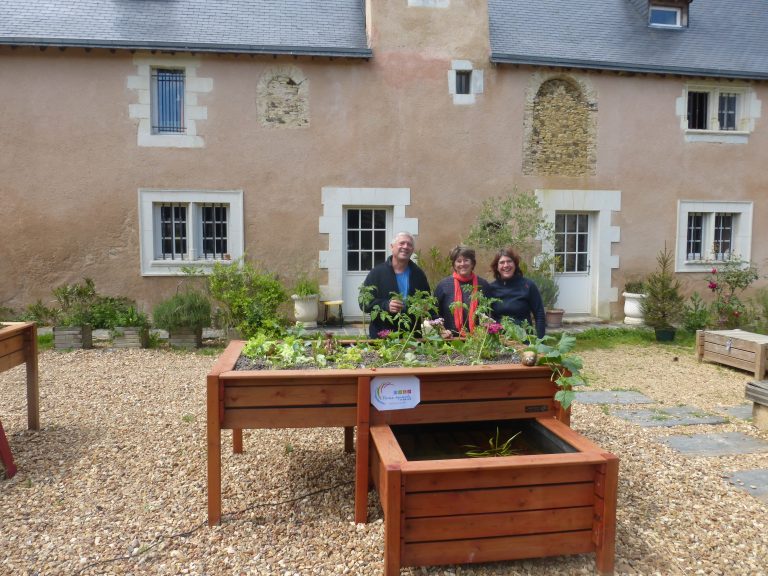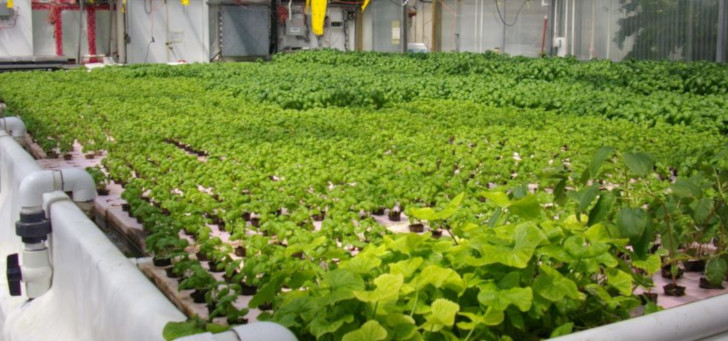How aquaponics will revolutionise urban landscaping
Do you know what the word aquaponics means? It is a word combining aquiculture - fish breeding - and hydroponics - growing plants in water. But, much more than that, this simple word means a process of integrated culture which could be the answer to the challenges of tomorrow’s world… We talked to Valérie Zimmermann, who runs the Ferme Aquacole d’Anjou, to find out more.

Do you know what the word aquaponics means? It is a word combining aquiculture - fish breeding - and hydroponics - growing plants in water. But, much more than that, this simple word means a process of integrated culture which could be the answer to the challenges of tomorrow’s world… We talked to Valérie Zimmermann, who runs the Ferme Aquacole d’Anjou, to find out more.
Also see: Edible public gardens
What exactly is aquaponics?

Pierre, Valérie Zimmermann, and Carole Bris, their partner at the Aquaculture Farm of Anjou
Aquaponics combines fish breeding with plant growing in a closed circuit. This association is found naturally in ponds where plants and fish exchange a lot.
How does that work?
Initially, the fish fertilize the water with their dejections. The nutrients in the enriched water are then sent to the kitchen garden or the plants, where another essential link comes into play - bacteria. They transform the ammonia in the fish dejections into nitrates, which feed the plants. By pumping the nitrates, the plants purify the water which can then be returned to the fish pond.
With a circuit like that, you create a real symbiosis between the fish and the plants. Human intervention is limited to feeding the fish!
The benefits of aquaponics
Aquaponics have a host of benefits. Above all, productivity is higher. Aquaponics provide a very rich fertilising medium, so plants grow more quickly.
Plants do not grow in the water all the time: with a domestic aquaponics and vegetable garden pond system, for example, the plants grow in clay balls. A high tide and low tide system makes it possible to empty the water into the breeding pond as soon as there is enough. In this way the plant roots are ventilated and only get the water and nutritive elements they need. This means it is much more productive than a traditional farm crop! Another advantage is that you can grow practically anything! Particularly leaf vegetables, fruit vegetables, aromatic herbs and ornamental plants too. You can add them for looks and even mix vegetables and flowering plants to fight parasites and limit insecticides.
And of course a system like this makes it possible to combine the pleasures of cultivating a kitchen garden and raising fish. Great fun for the owners of domestic systems and for the inhabitants of towns equipped for aquaponics.

A problem-solving ecosystem
Aquaponics are the solution to many everyday problems.
- They are very environmentally-friendly. They do not impact the environmental as there are no wastes. Fish dejections, the only wastes, are used to feed the plants… And as the installations are above-ground, there are fewer parasites and insects – so you don’t need fertilizers or plant care products…
- Aquaponics respect water. Water is becoming a rare commodity… As the system is a closed circuit, you don’t need to sprinkle – saving water and freeing private individuals and municipalities from watering chores. And as the water in the fish pond is purified by the plants, it doesn’t need changing very often.
- Aquaponics are a solution for encouraging urban biodiversity. And even better, it supports it not only by the plants and the fish but also because the aquatic ecosystem attracts birds, and insects… and the kitchen garden attracts external pollinators.
- Installed in towns, aquaponic systems make it possible to produce fish (trout, for example) and plants close to consumers in a short production circuit whether used for personal consumption, market gardening or fish breeding. Land is becoming scarcer and aquaponics does not need more!
- Lastly, installed in municipal parks and gardens, aquaponics encourage sociability through discussions, sharing and gardening together. In urban centres, hospitals and retirement homes, aquaponic ponds are fun, learning and togetherness.
Access to food is a growing problem and as production methods change, aquaponics are one of the eco-responsible systems requiring few resources that facilitate access to healthy local products.
What do you need to do to set up an aquaponic system?
Aquaponic systems can be installed in private homes, in companies and in municipalities. But you need to distinguish between domestic aquaponics systems and larger scale, "industrial" systems. Ponds like those at the Ferme Aquacole d’Anjou can be made-to-measure but are generally sold as kits, with simply-assembled wooden boards. So all you need are the kits – as well as the fish and the plants!
As for where to put them, aquaponic kits can go everywhere - on terraces, roofs, balconies, gardens, allotments and in therapeutic gardens…
Aquaponic systems are at Paysalia 2017, where you can meet Valérie Zimmermann and her ponds… If you are landscape designer, you will even get a 25% discount! So go to the Show!

